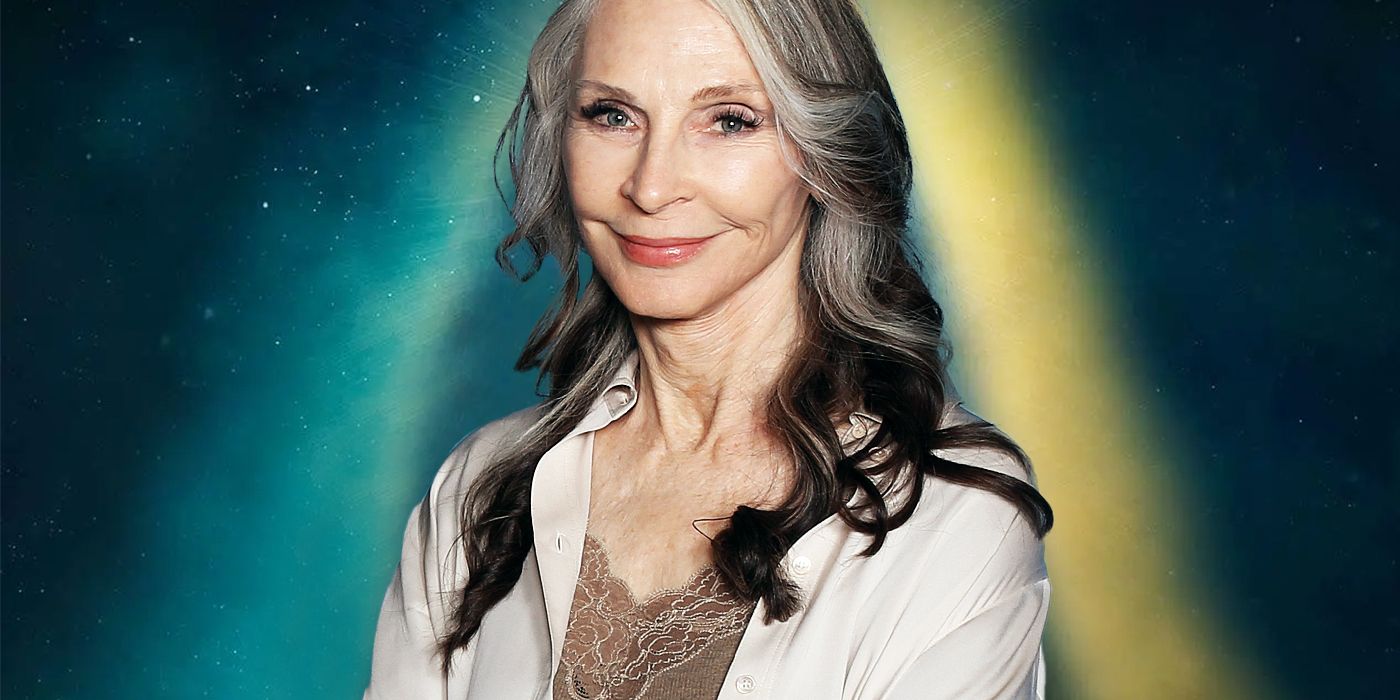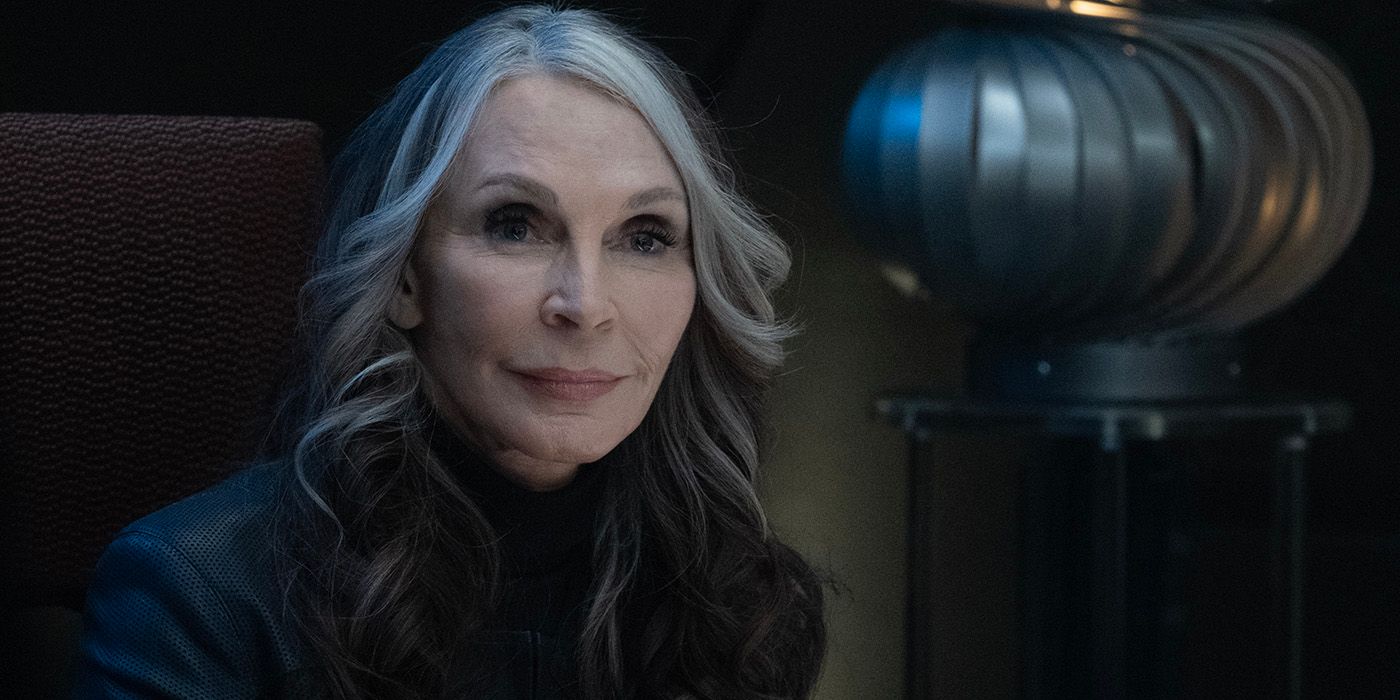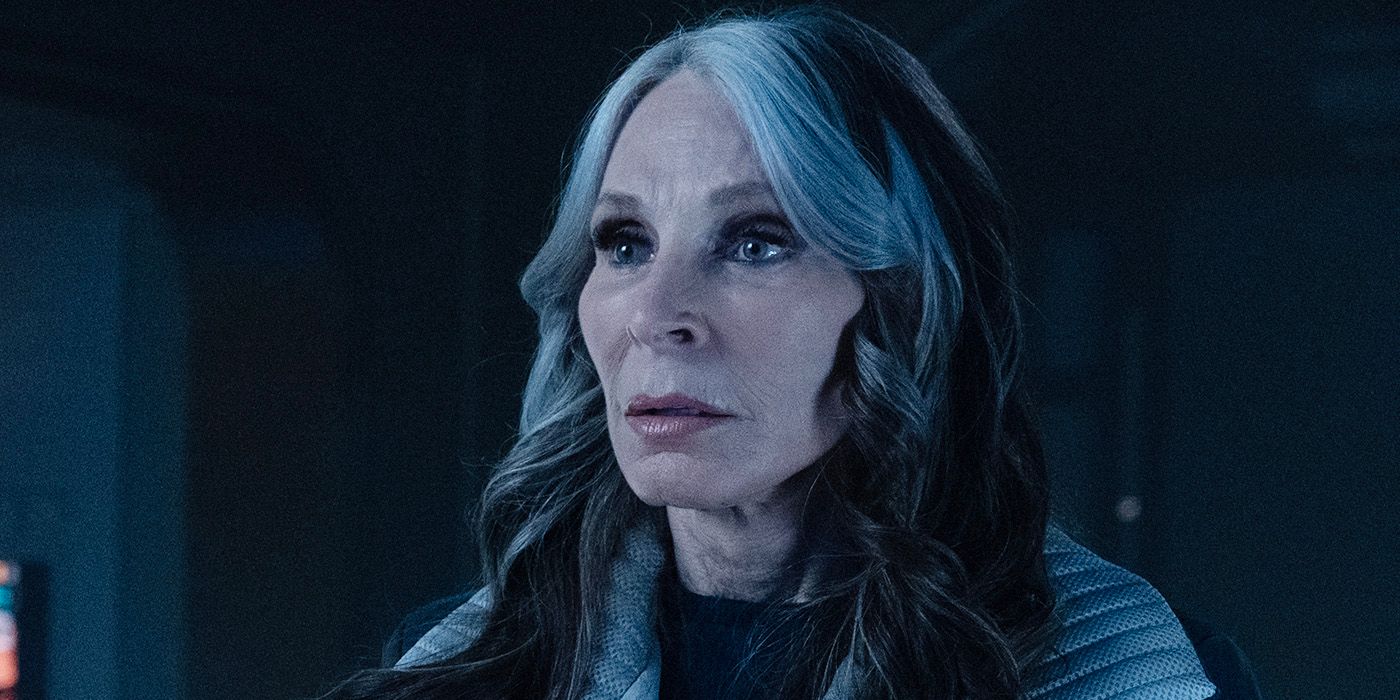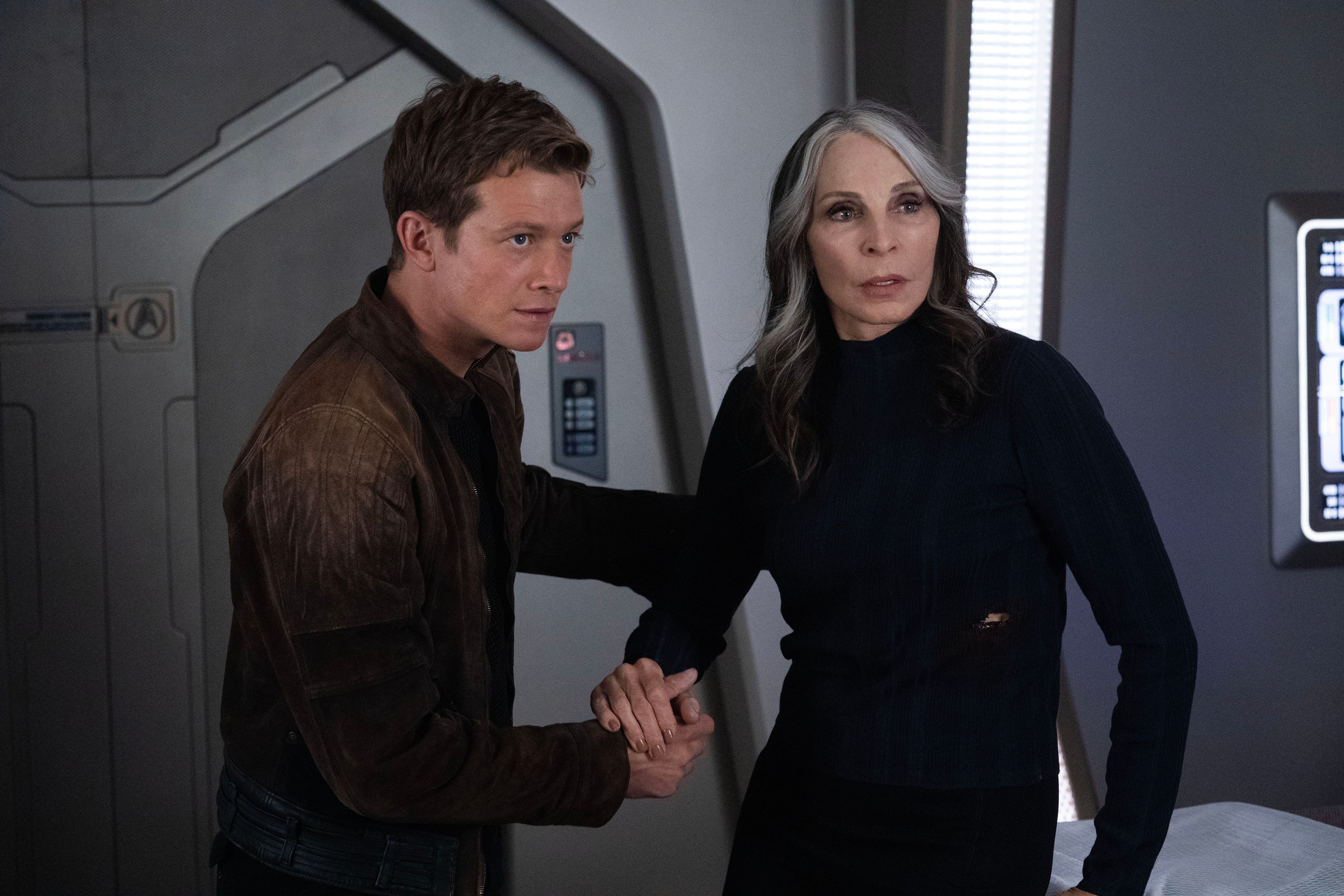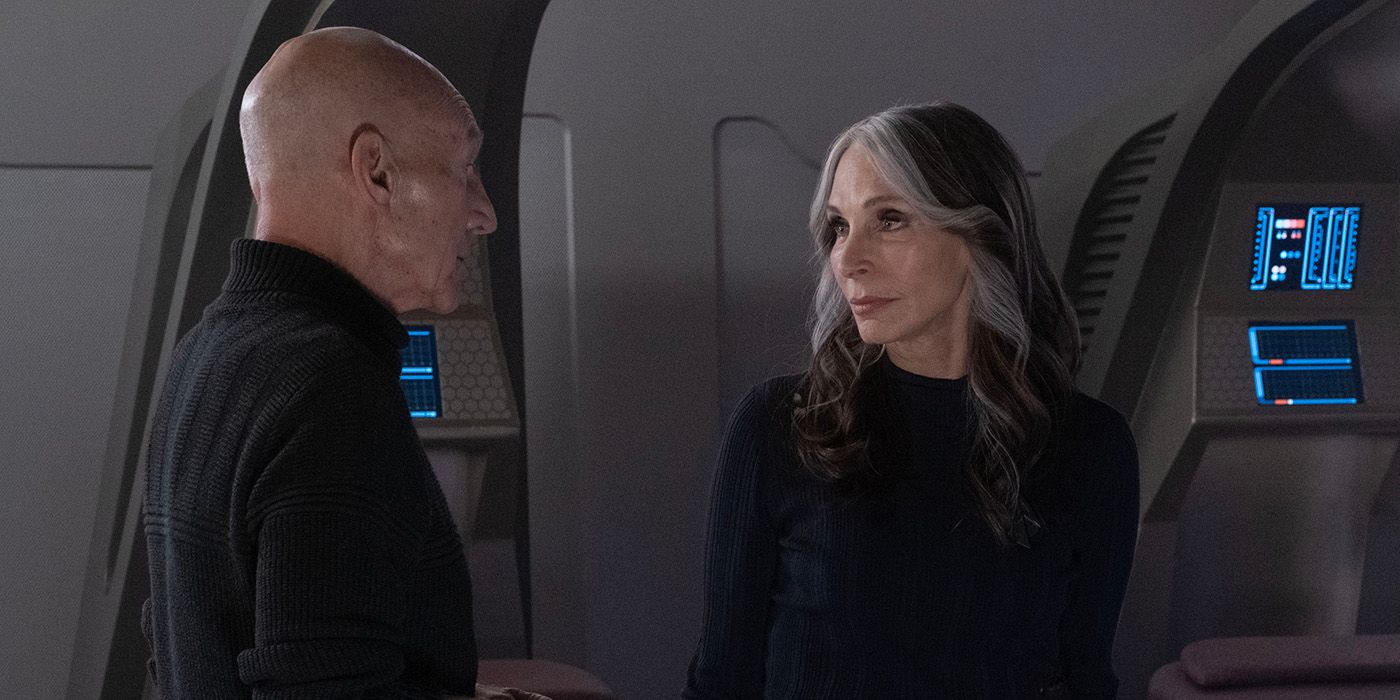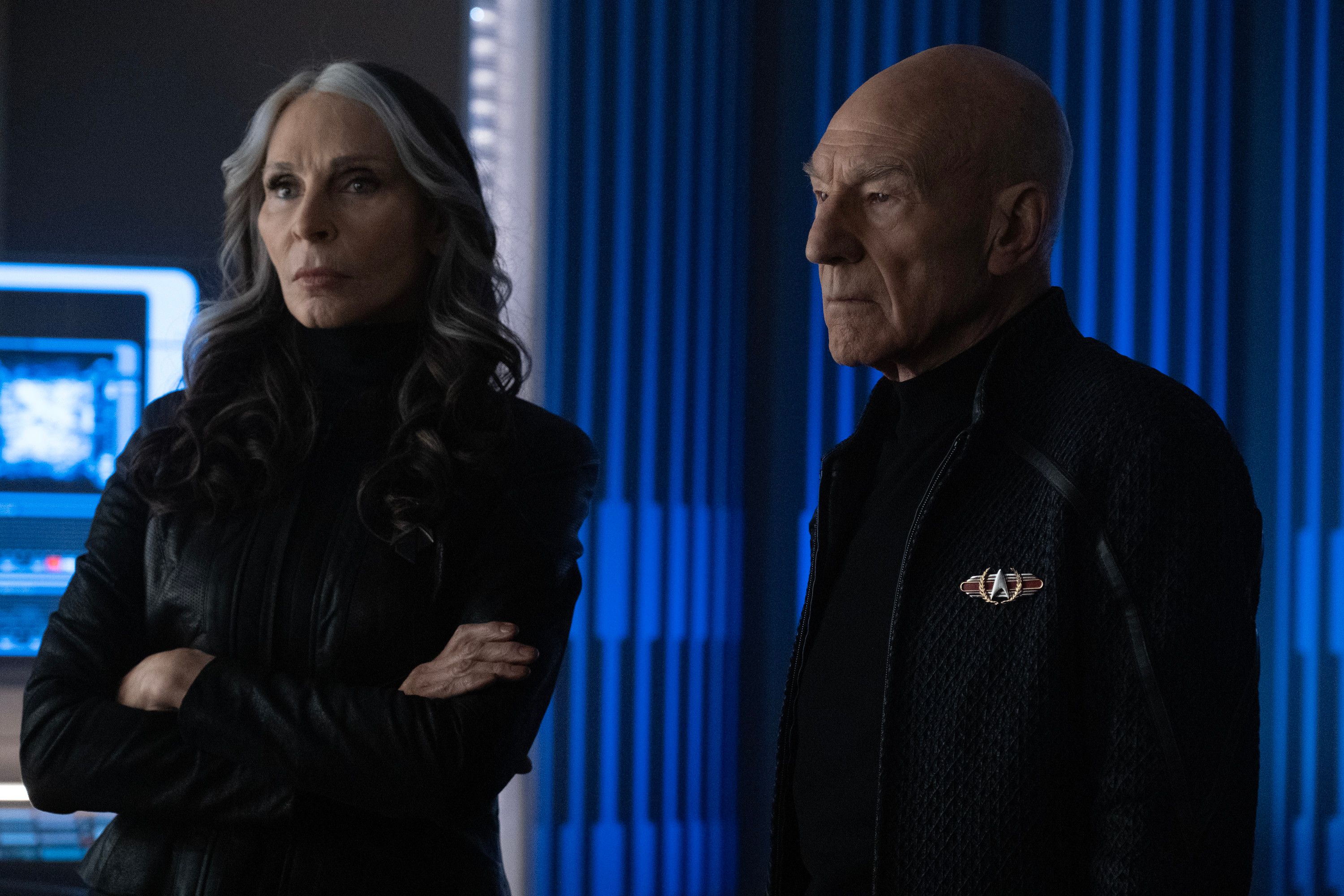Gates McFadden, best known for her role as Beverly Crusher in Star Trek: The Next Generation has taken the small screen by storm once again, reprising the role 20 years later in Season 3 of Star Trek: Picard, which is rocketing towards its final episode. McFadden has also taken over the airwaves recently, launching Season 2 of her podcast InvestiGates: Who Do You Think You Are? earlier this year, with new episodes dropping every Tuesday. On InvestiGates, McFadden goes on a deep dive with her fellow Star Trek stars and creatives to learn more about who they really are beyond the small screen.
Recently Collider's own Samantha Coley sat down with McFadden to discuss Season 2 of InvestiGates and Season 3 of Star Trek: Picard. During their conversation, McFadden revealed her dream guests for the podcast, what she's learned about editing and creating content, and why she uses this platform to find the human connection in commonality. McFadden also discussed Beverly Crusher's moral dilemmas in Season 3 of Star Trek: Picard, what she loves about the character after all these years, what it was like to film the Next Generation reunion, and whether she would be open to returning for a Star Trek: Legacy spinoff series.
COLLIDER: You've been doing this podcast for a couple of years now. How would you say that it's evolved since you started it and have your goals for these conversations changed since those early episodes?
GATES McFADDEN: Well, the biggest difference is that the first group were friends of mine that I was very close to. And now this season I'm talking to people who I've either just met recently before I spoke with them. Now, I know them better. But either that or they were people from other shows who I would meet and I had talked to, but I didn't really spend a lot of time with. I didn't know a lot about them. People like Alexander Siddig or John Billingsley I knew very well because we would end up being in green rooms together, for example.
McFADDEN: So, I think it's a lot of fun to get to know new people, especially because I think I was more nervous doing my friends, which is funny, but I know how particular they are and so I thought, "Well, okay. I don't know what they're going to be willing to share or go over it. Are there stories they've told too many times?" So, I think I was maybe better with some of the... I think my second season might be better than my first season because I learned more about what to ask. When you hear your own voice, I don't know how you feel about this, but it's like torture.
Oh yeah, I completely agree.
McFADDEN: And also, I don't know about you, but there were so many times, and there still are, where I go, "Just shut up Gates. Just shut up." Does that ever happen to you, Samantha?
All the time. I do a podcast as well and I cannot listen to it back.
McFADDEN: There's just so many ticks and all of that. So if you ever want to learn about what you don't want to know about yourself, but you should know, do a podcast and listen to yourself.
What would you say is the biggest thing that you've gained from doing this podcast and what are you hoping people take away from it?
McFADDEN: Well, I've learned how to sound edit. Which is a huge thing actually. It takes hours and hours. And then I send it to the technician who really cleans up my edits, but they don't change my edits. My edits are my edits. I've taken out all of the people clearing their throats and things like that, as well as just tightening things up because I've learned not to do so long of a podcast because I end up having to edit it down to 50 minutes basically, or 55 minutes. And the more I have, the harder that task is.
But also, it gives me a range of stories or things to talk about. So, it's a plus and a minus. I think what I want people to take away from it is that every one of us has all these interesting stories and you think you know someone, but maybe you don't know.
Sort of like a peek behind the curtain.
McFADDEN: Yeah, and I feel we are all connected as human beings and we all have our struggles and I wanted to try to be as honest as I could be about different things that we all go through and what our dreams are and what we're wishing for and the commonality in our struggles and the joy in family and talking to each other. And it's a Star Trek community, it's a brilliant community. I'm so honored to be part of it. And now I'm finally taking it all in. As an older person, I'm going, 'Man, what a wonderful ride this has been. What a fortunate community I live among.' So anyway, I've really learned how my struggles are just like other people's struggles and being vulnerable, and I do feel vulnerable when I do this.
Absolutely.
McFADDEN: I think that's been very hard. You have to stay open and risk sounding like an idiot.
If it helps, I’ve listened to quite a bit and you don't sound like an idiot.
McFADDEN: Well, thank you. Maybe I edited out the idiot part. So, I don't know.
Well, you're very good at it. So as you mentioned, for this season, you're talking to a lot of talents that you haven't worked with necessarily on screen. Can you go into a little bit more about what it's like to engage with these people that you may not have worked with in a show, but whose careers overlap with yours so significantly?
McFADDEN: Well, I think that's why I wanted to do this InvestiGates. I like to go back to who their parents are, where did they grow up, what was it like—things that I often go back to. I feel that the games we play as children are very important. Did you have a sense of play when you were young? So many actors had a great sense of play and the games they played are really important to how their creativity unfolds sometimes. So, that's very fascinating to me personally. I love that about anybody. It could be the person sitting next to me on the plane. You can have a very deep encounter with someone you don't know very well if you all just listen and ask the right questions.
Absolutely. You've mentioned that you do a lot of research for each guest that you have on. How does that differ from person to person?
McFADDEN: Well, take Tawny Newsome. I wish I could see her live performances at Second City, improvising in Chicago. I would love to have seen that, but I can't. So, instead, I know a lot about Second City. I have had friends who've been in Second City. So on something like that, I know the kind of improvisational background she has. I had a very strong impression of her when I first met her. She's extraordinary and very smart and beautiful. So when you have a really strong gut feeling about somebody, it makes it fun to just see what you can find out there on the internet. And I watched different shows that she had performed in and I would find things she'd acted in. You look at interviews, I would listen to podcasts that she had spoken on, and that's kind of where you start.
And as I was researching with hers, for example, I was finding the things we had in common, be it astrology or being brought up Catholic, whatever it is. And that's kind of where you start. With Kate Mulgrew, I read her books and I watched all the different things that she did. I didn't see everything. I didn't have to see everything. And I know a lot of people who are friends of hers. Even though I hadn't spent as much time with her, I spent a lot of time with these friends of mine. People like Andy Robinson. He and I were both at USC together teaching. So, he was head of the graduate acting department. I mean, again, there are overlaps and that's what's really fun about it, is to figure out the overlaps.
I think that the level of personal care and dedication you put into each of these conversations really comes through in each episode. I was just listening to your conversation with Tawny this morning and the way that you two light each other up was delightful.
McFADDEN: Oh, thanks.
You have a few more episodes in this season. Who are some guests that you have lined up that you're excited to talk to if you haven't recorded already, or episodes you’re excited for fans to hear that are not up yet?
McFADDEN: Well, the one's coming up... So, today is Alexander Siddig who played the doctor on Deep Space Nine. Yeah. I mean, what a fascinating man. What a brilliant actor. Next week I have Terry Matalas, who was-
Amazing!
McFADDEN: Yeah. Our producer for this season of Picard, who I adore, and he's just wonderful. So, people are going to learn more about him. I have Ed Speleers coming up who plays my new space son on Picard Season 3. And then I have Anson Mount. And that will conclude Season 2.
Those all sound like amazing episodes. If you come back for a third season, who are some of your dream guests that you'd like to talk to?
McFADDEN: Well, I really would love to speak with Sonequa. I think she's an extraordinary actor and whenever we've met in the green rooms, she has this very extraordinary presence. I would like to get to know her, find out about her. I think all of the actors in the new shows are terrific. Obviously, my dream guest probably is Michelle Yeoh. That would be amazing.
Oh, yes!
McFADDEN: But I doubt I could get her at this point. But who knows? That would be a dream person. And also the other actors on Strange New Worlds, some of the Lower Deck actors. And then we have the maybe two new series happening. And of course Todd Stashwick. I mean, he's just fantastic. So, I'd love to speak with him. I adore him. So, that's a good start.
Yeah, those are great answers. I would love to listen to those conversations. So speaking of the third season of Picard, you're doing some truly fantastic stuff with Beverly. How much influence did you get to have over some of these really key moments for her? Namely, the conversation with Picard in Episode 3, and then most recently, her moral conflict with Vadic.
McFADDEN: With the third episode with the scene with Patrick [Stewart] and I, that one was the trickiest because I did not want one person or the other to have clearly made the wrong ethical choice, and I was worried about that the most. So, I fought for certain things. Certain things got taken out that I thought were more on Beverly's side as an explanation, but I tried to play it as strongly as I could in the way it was written. As I've said several times, the show's called. It's not called Crusher. So, I think he was going to have more final say in how the scene was going to be in terms of lines. I think the one with Vadic, it's a very tricky scene. I love the fact that you see this woman who's so vulnerable and exhausted by this. This has been going on for quite some time in her life.
And she thinks it is because of this person. This is the person who has done all of the Changelings, and she doesn't know anything more than that. So, I feel that I've... Well, let me put it this way. I've always thought to myself, you see what people do, the horrible things humans can do to each other. And I've thought to myself, the only time I could ever see myself really just striking out and hurting someone or killing someone would be protecting my son, my family. And so, I think she's in that position. And if you're exhausted, you look at in wartime and the exhaustion that must happen and the post-traumatic stress of things, I don't think you always are in a state where you can control every emotion and reaction you're feeling. You strive to. And I think that certainly everyone's character is always striving to do that, do work for the greater good.
But she speaks honestly when she says, "I don't know, I think I'm losing my moral compass." She wants to hold on to that moral compass, but she's at least aware that it might be slipping. So, I love the fact that they present it so that the audience is going to have to think about what they would do. They end up not killing her, something else happens. But to just put yourself in that position and imagine what you would do is very important because none of us know what we would do until we're in that situation. I mean, look at the Holocaust, The Night of Broken Glass, when all that was happening, Crystal Night. If you weren't there, how can you say what you would do or would not do to save your family? So, again, I like the fact that it was a scene that was engaging us on those very extreme levels.
I think you played both of those moments in particular just phenomenally.
McFADDEN: Oh, thank you.
Wonderful work. What was it like establishing the new family dynamics with Jack and, to an extent, Picard? Did you do a chemistry read with Ed? You two just... I believe that relationship so much.
McFADDEN: Oh, thank you. Well, he's such a wonderful actor. Oh, he's so wonderful. We just clicked. We totally just clicked. And once I got over the fact that he was going to have a British accent, which was pretty funny. No, he was just a joy to work with. So, it was easy working with him. He's one of those actors. So, I'm glad it reads like we feel. I love him. He's got two great kids and a wonderful wife. And yeah, he feels like my new space son. I'm so lucky. I've got two space sons and a real son.
Well, I can't wait to listen to that conversation coming up. So I've seen through episode eight, and this will probably go up past that episode. Can you talk a bit about the reunion moment?
McFADDEN: Well, it was what you would imagine it was. But you see, we all are in each other's lives. We are close friends. We're in a group text. We know what's basically going on in each other's lives. What was a trip is to go back to this big observation lounge table. That was a trip. But it reminded us of how long those shooting days used to be. Because when we were around the observation lounge in the original show in the Enterprise D, it would take the whole day to just go around the table, even if you had one line because they had to do closeups and medium shots, and then the master shot. Now, they shoot things much faster because they have so many cameras going at the same time.
It still does take a long time though, when you have a group of people at a table. But it was pretty cool, I have to say. I think for me, the moment that really got to me though was when I was on the Titan bridge the first time with Patrick and Jonathan and I was like, "Oh my gosh, we're on a bridge of a ship and we're doing this and we're in costumes." It was something about the spaceship. It's an amazing set. But yes, it was tremendous to have the chance for all of us to be there acting together. I love them all. They're an amazing group of human beings, and they're wonderful actors.
I've just been loving this season. It's fantastic so far. Is there anything that you can tease for fans heading into the final two episodes?
McFADDEN: Absolutely not.
I completely understand.
McFADDEN: All I will say is it is such a ride. Oh my gosh, the pace quickens and the plot thickens, and look out. Yeah. Anyway, that's all I can say.
Fantastic, I can’t wait. There's been a lot of chatter about a potential spinoff, a Legacy spinoff about Jack and some of the other characters. Would you be open to returning to something like that? And what's your vision for Beverly in the future, if you can tease that at all?
McFADDEN: I would certainly be open to something like that. I have no idea what my vision of her would be. I mean, I'm interested in a lot of things. It would depend on the given circumstances. I think she certainly has... What's been great about this season is you see that she's the one who will keep looking for the solution. She's definitely a scientist as well as a humanist and a doctor, and I think that's really cool that she's always thinking, "What can I do to get us out of this situation and what am I not seeing?" And that's great. I love that about her character. I also think it's fantastic that we haven't seen her for 20 years and she was doing this exploring, going to all these dangerous places out in space. I mean, that's also would be really fun to see more of what that was like. But I'd love to see more with her space son. That would be fantastic. I use the word fantastic a lot. I've noticed that in my podcasts.
Well, when it fits!
McFADDEN: Anyway, that's about it. Yeah, there you are.
Wonderful. Thank you so much for taking the time to chat with me.
McFADDEN: I hope you love the final episodes as much as I love them.
You can catch McFadden in the Star Trek: Picard series finale which hits Paramount+ on April 19, and you can listen to Seasons 1 and 2 of InvestiGates on your favorite podcast app.

